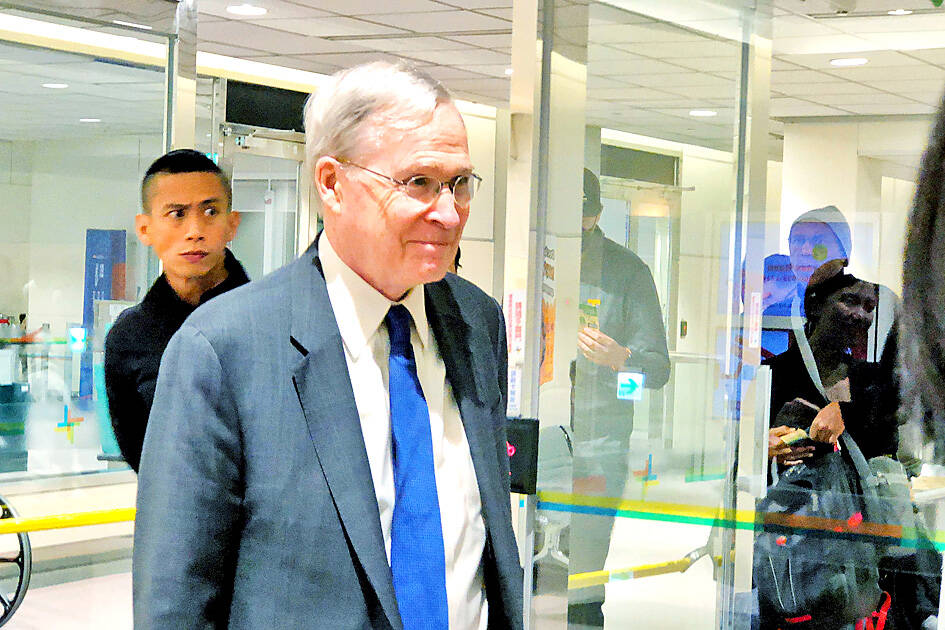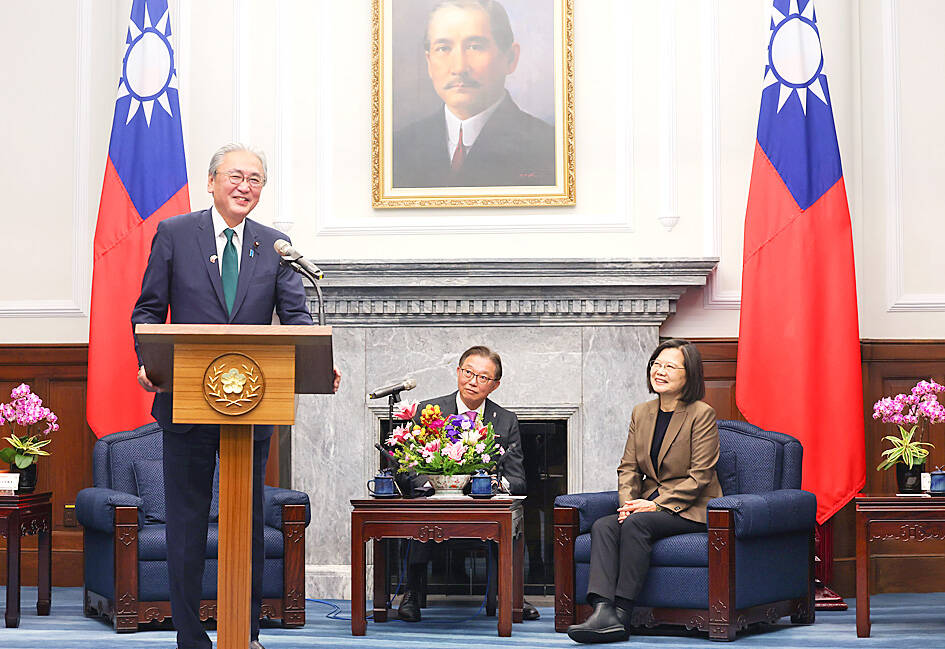Two former senior US officials arrived in Taiwan yesterday for post-election talks and to underscore the US government’s “longstanding interest” in peace across the Taiwan Strait, the American Institute in Taiwan (AIT) said yesterday.
The Democratic Progressive Party’s (DPP) presidential candidate William Lai (賴清德), who won Saturday’s presidential election, is to take office on May 20.
A senior White House official last week said that, in a show of support for Taiwan, US President Joe Biden planned to send an unofficial delegation to Taiwan after Saturday’s elections.

Photo: CNA
The AIT yesterday said that former US national security adviser Stephen Hadley and former US deputy secretary of state James Steinberg would visit Taiwan.
“As we have done previously following a Taiwan presidential election, the US government has asked former senior officials to travel in their private capacity to Taiwan,” the AIT said, adding its US-based chair Laura Rosenberger was accompanying the duo.
The delegation is today to “meet with a range of leading political figures and convey congratulations from the American people to Taiwan on its successful elections, support for Taiwan’s continued prosperity and growth, and our longstanding interest in cross-Strait peace and stability,” the AIT said.

Photo: CNA
In other news, Japanese Representative Keiji Furuya, chair of the Japan-ROC Diet Members’ Consultative Council, Japanese Representative Yasushi Kaneko and Japan-Taiwan Exchange Association chairman Ohashi Mitsuo are in Taiwan to congratulate the Taiwanese public for the elections.
The two representatives and Mitsuo yesterday had separate meetings with President Tsai Ing-wen (蔡英文) at the Presidential Office Building in Taipei, and Lai at the DPP headquarters in Taipei.
Lai thanked the three for their trip highlighting the profound friendship between Taiwan and Japan.
The two countries are close democratic partners caring about regional peace and stability, and sharing common values such as democracy, Lai told Mitsuo, adding that he hoped to continue exchanges with Japan on economy, trade, net zero transition and innovation.
Japanese people understand the importance of the ties between Taipei and Tokyo, Mitsuo said, adding that Japan is looking forward to continuing to deepen cooperation and exchanges with Taiwan’s future government.
Mitsuo told Tsai that he is looking forward to working with Lai to further improve Taiwan-Japan relations, adding that the election result is an approval by Taiwanese people to Tsai administration’s policies.
Despite China’s various attempts to interfere in Taiwan’s elections, the nation elected its new leaders through democratic procedures, which was “sending an important message to the world,” Furuya said during the meeting with Tsai.
His council is to continue cooperating with the Taiwanese government to build a free and open Indo-Pacific region, he added.
All three Japanese representatives also expressed gratitude to Taiwanese for showing concern for their country after a magnitude 7.5 earthquake struck the Noto region of Japan’s Ishikawa Prefecture on Jan. 1.

MAKING WAVES: China’s maritime militia could become a nontraditional threat in war, clogging up shipping lanes to prevent US or Japanese intervention, a report said About 1,900 Chinese ships flying flags of convenience and fishing vessels that participated in China’s military exercises around Taiwan last month and in January have been listed for monitoring, Coast Guard Administration (CGA) Deputy Director-General Hsieh Ching-chin (謝慶欽) said yesterday. Following amendments to the Commercial Port Act (商港法) and the Law of Ships (船舶法) last month, the CGA can designate possible berthing areas or deny ports of call for vessels suspected of loitering around areas where undersea cables can be accessed, Oceans Affairs Council Minister Kuan Bi-ling (管碧玲) said. The list of suspected ships, originally 300, had risen to about 1,900 as

Japan’s strategic alliance with the US would collapse if Tokyo were to turn away from a conflict in Taiwan, Japanese Prime Minister Sanae Takaichi said yesterday, but distanced herself from previous comments that suggested a possible military response in such an event. Takaichi expressed her latest views on a nationally broadcast TV program late on Monday, where an opposition party leader criticized her for igniting tensions with China with the earlier remarks. Ties between Japan and China have sunk to the worst level in years after Takaichi said in November that a hypothetical Chinese attack on Taiwan could bring about a Japanese

MORE RESPONSIBILITY: Draftees would be expected to fight alongside professional soldiers, likely requiring the transformation of some training brigades into combat units The armed forces are to start incorporating new conscripts into combined arms brigades this year to enhance combat readiness, the Executive Yuan’s latest policy report said. The new policy would affect Taiwanese men entering the military for their compulsory service, which was extended to one year under reforms by then-president Tsai Ing-wen (蔡英文) in 2022. The conscripts would be trained to operate machine guns, uncrewed aerial vehicles, anti-tank guided missile launchers and Stinger air defense systems, the report said, adding that the basic training would be lengthened to eight weeks. After basic training, conscripts would be sorted into infantry battalions that would take

DEEP-STRIKE CAPABILITY: The scenario simulated a PLA drill that turned into an assault on Taiwan’s critical infrastructure, with the launchers providing fire support Taiwan yesterday conducted this year’s first military exercises at Longsiang Base in Taichung, demonstrating the newly acquired High Mobility Artillery Rocket System’s (HIMARS) ability to provide fire support and deep-strike capabilities. The scenario simulated an attack on Penghu County, with HIMARS trucks immediately rolling into designated launch areas and firing barrages at the Wangan (望安) and Cimei (七美) islands, simulating the provision of fire support against invading forces. The HIMARS are supposed to “fire and leave,” which would significantly increase personnel and equipment survivability, a military official said. The drill simulated an exercise launched by the Chinese People’s Liberation Army (PLA) Eastern